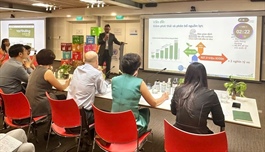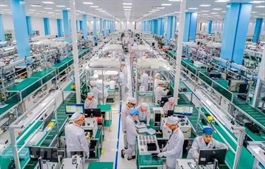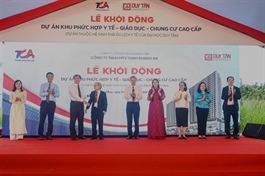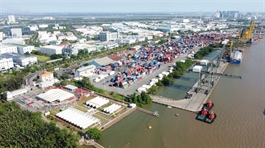Green-digital goals require balance
Green-digital goals require balance
Vietnam is witnessing strong growth in data centre development as the country seeks feasible solutions to balance technological advances with environmental sustainability.
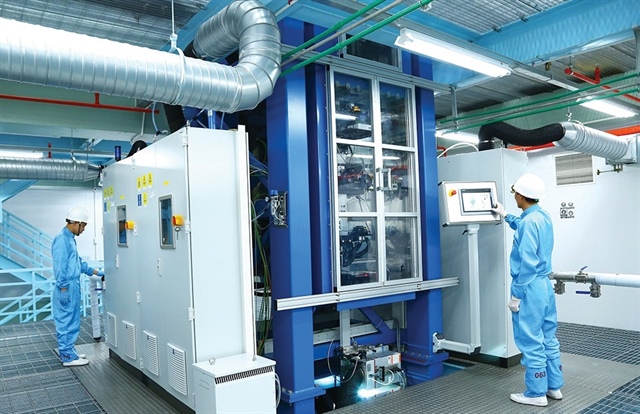
Photo: LeToan |
In late August, Netherlands-headquartered IPTP Networks, a global telecommunications and infrastructure group, launched the AIDC DeCenter Data Centre in the central city of Danang. The facility will have capacity for 1,000 racks, a minimum power output of 10MW, and total capital of $200 million. Construction is expected to begin in March 2026.
Also last month, LG CNS signed an MoU with VNPT and Korea Investment Real Asset Management to jointly develop a hyperscale AI data centre in Vietnam.
According to technology experts, the rapid expansion of such data centres and digital infrastructure is creating a paradox: while digitalisation supports climate change adaptation and mitigation, it also consumes large amounts of energy and generates significant waste.
“Every three years, the world’s data doubles, and Vietnam is no exception as its data volume rises even faster. The core issue driving digital transformation is therefore digital infrastructure,” expert Tien Hoang said.
The European Chamber of Commerce (EuroCham) in Vietnam’s Digital Sector Committee stressed that balancing growth and sustainability requires looking at the entire digital ecosystem – from powering infrastructure with renewable energy to managing devices across their lifecycle and designing innovation with efficiency in mind.
“For example, powering data centres and telecom networks with renewable energy significantly reduces the footprint of the digital economy, while stronger e-waste management and circular economy practices can help conserve valuable resources,” said Bruno Sivanandan, co-chair of the committee. “At the same time, innovation in software and hardware design increasingly focuses on energy efficiency, from low-carbon cloud services to algorithms requiring less computing power.”
The Academy of Science and Technology Strategy noted that digital transformation is already challenging efforts to ensure environmental sustainability, with data centres among the biggest energy consumers.
Figures from the academy showed that in 2022, data centres consumed 240–340 billion kWh, about 1.3 per cent of global electricity. The IT industry as a whole uses 6–10 per cent of global electricity, emitting 3.7 per cent of total greenhouse gas emissions.
“Vietnam faces an urgent need to achieve economic development alongside environmental sustainability. This is challenging but also promising, and essential if the country is to fulfil its net-zero commitment by 2050 and enhance overall competitiveness,” Vu Van Tich, deputy director of the academy, told VIR. “Without clean energy solutions, the digitalisation process will put additional pressure on the national grid and drive up emissions, making it harder to meet sustainable development targets.”
Vietnam is seeing growing interest from domestic and international businesses developing data centres to meet soaring demand, particularly as AI drives rapid increases in data processing.
According to Cushman & Wakefield, by 2024 Vietnam had 51MW of operational data centre capacity, 11MW under construction, and a further 28MW planned. Ho Chi Minh City accounts for half of the country’s operational capacity.
Vietnam’s data centre market is projected to reach $1.75 trillion by 2030, growing at a compound annual rate of almost 18 per cent, according to Research and Markets.
Local technology firms such as VNPT, Viettel, CMC, FPT, and VNG are actively expanding their data centre networks. CMC plans to invest up to $500 million in facilities in Vietnam, Japan, and several other countries by 2028.
In April, Viettel began building its high-tech data centre and research and development complex in Ho Chi Minh City. Once completed, it will be among the 10 largest in Southeast Asia. Viettel is also planning 11 large-scale data centres with combined capacity exceeding 350MW, representing about 40 per cent of the country’s total.
“Leading digital companies sit at the heart of this challenge,” said Sivanandan of EuroCham. “On one hand, their data centres, telecom networks, and device supply chains contribute significantly to emissions. On the other, these companies provide the technologies that help other industries cut carbon and adapt to climate risks. Their responsibility is twofold: to decarbonise themselves and to enable broader climate action.”
To support sustainable growth, the Ministry of Science and Technology is rolling out solutions focused on greener digital infrastructure.
According to national planning in ICT towards 2030, approved in 2024, all new data centres must meet global green standards. Investors are required to ensure that the Power Usage Effectiveness index of newly built facilities does not exceed 1.4, below the global average. The ministry is also working with agencies to raise awareness, improve digital skills, and promote green practices.
- 10:57 08/09/2025








